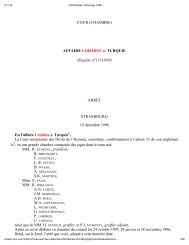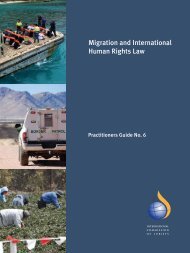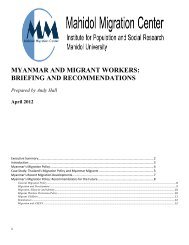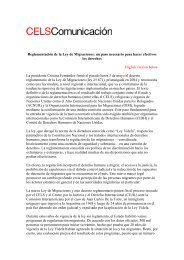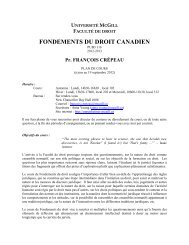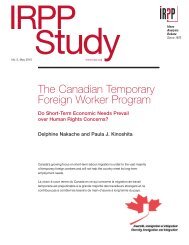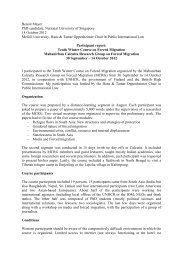Preventive Detention, Suspected Terrorists, and War
Preventive Detention, Suspected Terrorists, and War
Preventive Detention, Suspected Terrorists, and War
Create successful ePaper yourself
Turn your PDF publications into a flip-book with our unique Google optimized e-Paper software.
COLE FINAL<br />
7/1/2009 12:43 AM<br />
712 CALIFORNIA LAW REVIEW [Vol. 97:693<br />
affidavit from a midlevel military official. 83 At most, it maintained, habeas<br />
corpus review should ask only whether the government’s affidavit constituted<br />
“some evidence” to support the detention, 84 an extremely deferential st<strong>and</strong>ard<br />
that precluded any inquiry into whether the affidavit’s assertions were in fact<br />
true, <strong>and</strong> that would not involve any evidentiary hearing.<br />
The Supreme Court recognized that detention under the narrow<br />
circumstances presented was statutorily authorized <strong>and</strong> constitutionally<br />
permissible, but insisted on much more robust procedural guarantees than the<br />
Bush administration provided. It ruled that detention for the purpose of<br />
preventing a fighter from returning to battle during a military conflict was<br />
supported by a long tradition under the laws of war, <strong>and</strong> was therefore<br />
authorized as a “fundamental incident” to Congress’s AUMF. 85 But it held that<br />
the government had failed to afford Hamdi adequate procedural protections. 86<br />
Due process required the government to provide Hamdi notice of the factual<br />
basis for his detention <strong>and</strong> a meaningful opportunity to contest the<br />
government’s allegations before an independent adjudicator. 87 Thus, even in<br />
wartime, an individualized showing of need, established in a fundamentally fair<br />
proceeding, is required if preventive detention is to satisfy due process. 88<br />
B. Fourth Amendment<br />
While preventive detention has most often been analyzed through the lens<br />
of due process, the Fourth Amendment also imposes limits on the practice. Its<br />
requirement that all seizures be “reasonable” has long been interpreted to mean<br />
that arrests (seizures of the person) generally require a showing of probable<br />
cause that the arrestee committed a criminal offense. 89 Since preventive<br />
detention requires an initial arrest, probable cause of some past or ongoing<br />
illegal activity under criminal or immigration law is generally required for<br />
preventive detention.<br />
Exceptions to this requirement in the detention setting would generally<br />
require a finding that a given seizure served special needs, above <strong>and</strong> beyond<br />
ordinary law enforcement, <strong>and</strong> was reasonable. 90 The material-witness law<br />
83. Id.<br />
84. Id. at 527-28.<br />
85. See id. at 519.<br />
86. Id. at 529-37.<br />
87. Id. at 533.<br />
88. See id. at 523.<br />
89. U.S. Const. amend. IV; see, e.g., Carroll v. United States, 267 U.S. 132 (1925).<br />
90. The Court has upheld searches <strong>and</strong> seizures without probable cause or a warrant where<br />
the search or seizure scheme serves special needs above <strong>and</strong> beyond ordinary law enforcement,<br />
<strong>and</strong> the scheme is otherwise reasonable. See, e.g., Michigan v. Sitz, 496 U.S. 444 (1990)<br />
(upholding sobriety checkpoint on highway where it served special need of highway safety, was<br />
applied across the board, <strong>and</strong> involved only a minimally intrusive, brief stop). In assessing<br />
reasonableness, the Court balances a number of factors, including the intrusiveness of the search,<br />
the extent to which it is st<strong>and</strong>ardized or discretionary, <strong>and</strong> its effectiveness. Id.



